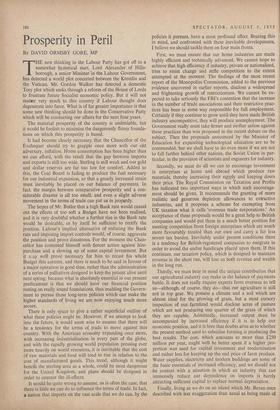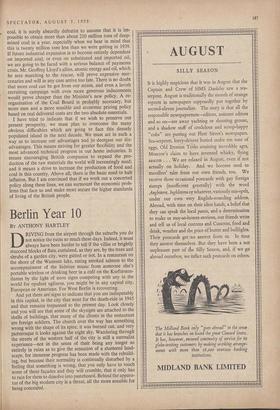Prosperity in Peril
BY DAVID ORMSBY GORE, MP THE new thinking in the Labour Party has got off to a somewhat hysterical start. Lord Alexander of Hills- borough, a senior Minister in the Labour Government, has detected a world plot concerted between the Kremlin and the Vatican. Mr. Gordon Walker has detected a domestic Tory plot which seeks through a reform of the House of Lords to frustrate future Socialist economic policy. But it will not matter very much to this country if Labour thought does degenerate into farce. What is of far greater importance is that some new thinking should be done in the Conservative Party which will be conducting our affairs for the next four years.
The material prosperity of the country is undeniable, but it would be foolish to minimise the dangerously flimsy founda- tions on which this prosperity is based.
It had become clearly necessary that the Chancellor of the Exchequer should try to grapple once more with our old adversary, inflation. Home consumption has been higher than we can afford, with the result that the gap between imports and exports is still too wide. Sterling is still weak and our gold and dollar reserves are far too low for comfort. Added to this, the Coal Board is failing to produce the fuel necessary for our industrial expansion, so that a greatly increased strain must inevitably be placed on our balance of payments. In fact, the margin between comparative prosperity and a con- siderable disaster is all too small, and even a slight adverse movement in the terms of trade can put us in jeopardy.
The hopes of Mr. Butler that a high Bank rate would cancel out the effects of too soft a Budget have not been realised, and it is very doubtful whether a further rise in the Bank rate would be desirable, or by itself be sufficient to rectify the position. Labour's implied alternative of reducing the Bank rate and imposing import controls would, of course, aggravate the position and prove disastrous. For the moment the Chan- cellor has contented himself with fiercer action against hire- purchase and a slowing up of some capital investment, But it may well prove necessary for him to recast his whole Budget this autumn. and there is much to be said in favour of a major operation in good time, rather than the administration of a series of palliatives designed to keep the patient alive until next spring; because what is absolutely essential in our present predicament is that we should have our financial position resting on really sound foundations, thus enabling the Govern- ment to pursue those long-term policies which can make the higher standards of living we are now enjoying much more secure.
There is only space to give a rather superficial outline of what these policies might be. However, if we attempt to look into the future, it would seem wise to assume that there will be a tendency for the terms of trade to move against this( country. With the American economy expanding once more, with increasing industrialisation in every part of the globe, and with the rapidly growing world population pressing ever more heavily on world resources, it is inevitable that the cost of raw materials and food will tend to rise in relation to the cost of manufactured goods. This trend, although it might benefit the sterling area as a whole, could be most dangerous for the United Kingdom, and plans should be designed in order to counter the ill-effects.
It would be quite wrong to assume, as is often the case, that there is little we can do to influence the terms of trade. In fact, a nation that imports on the vast scale that we do can, by the policies it pursues, have a most profound effect. Bearing this in mind, and confronted with these inevitable developments, I believe we should tackle them on four main fronts.
First, we must ensure that our home industries are made highly efficient and technically advanced. We cannot hope to achieve that high efficiency if industry, private or nationalised, tries to resist change and stifle competition to the extent attempted at the moment. The findings of the most recent report of the Monopolies Commission, added to the previous evidence uncovered in earlier reports, disclose a widespread and frightening growth of restrictionism. We cannot be ex- pected to take seriously the FBI's contention that the increase in the number of trade associations and their restrictive prac- tices has been in some way responsible for full employment. Certainly if they continue to grow until they have made British industry uncompetitive, they will produce unemployment. The Government really must take firmer and swifter action against these practices than was proposed in the recent debate on the subject. Then the proposals announced by the Minister of Education for expanding technological education are to be commended, but we shall have to do even more if we are not to fall farther behind other nations, the Soviet Union in par- ticular, in the provision of scientists and engineers for industry.
Secondly, we must do all we can to encourage investment in enterprises at home and abroad which produce raw materials, thereby increasing their supply and keeping down their price. The Royal Commission on Taxation and Profits has indicated two important ways in which such encourage- ment should be given. It recommends the granting of more realistic and generous depletion allowances to extractive industries, and it proposes a scheme for exempting from UK taxation what it calls 'overseas trade corporations.' An acceptance of these proposals would be a great help to British companies and would put them in a much better position for meeting competition from foreign enterprises which are much more favourably treated than our own and carry a far less severe tax burden. Inevitably under present conditions there is a tendency for British-registered companies to emigrate in order to avoid the undue handicaps placed upon them. If this continues, our taxation policy, which is designed to maintain revenue in the short run, will lose us both revenue and wealth in the long run.
Thirdly, we must bear in mind the unique contribution that our agricultural industry can make in the balance of payments battle. It does not really require experts from overseas to tell us—although, of course, they do—that our agriculture is still not in top gear. We possess a climate and a soil which are almost ideal for the growing of grass, but a most cursory inspection of our farmland would disclose acres of pasture which are not producing one quarter of the grass of which they are capable. Admittedly, increased output must be accompanied by increased efficiency if it is to help our economic position, and it is here that doubts arise as to whether the present method used to subsidise farming is producing the best results. The cost, which amounts to more than £250 million per year, might well be better spent if a higher pro- portion was used for capital investment and modernisation and rather less for keeping up the end price of farm produce. Water supplies, electricity and modern buildings are some of the basic essentials of increased efficiency, and we should not he content with a situation in which an industry that can immensely reduce our dependence on imports is barely attracting sufficient capital to replace normal depreciation.
Finally, living as we do on an island which Mr. Bevan once described with less exaggeration than usual as being made of coal, it is surely absurdly defeatist to assume that it is im- possible to obtain more than about 210 million tons of deep- mined coal in a year, especially when we bear in mind that this is twenty million tons less than we were getting in 1939. If future industrial expansion is to become entirely dependent on imported coal, or even on substituted and imported oil, we are going to be faced with a serious balance of payments crisis. Mr. Geoffrey Lloyd's allies, atomic energy and oil, which he sees marching to the rescue, will prove expensive mer- cenaries and will in any case arrive too late. There is no doubt that more coal cari be got from our mines, and even a lavish recruiting campaign with even more generous inducements would prove cheaper than the Minister's new policy. A re- organisation of the Coal Board is probably necessary, but more men and a more sensible and economic pricing policy based on real delivered costs are the two absolute essentials.
I have tried to indicate that if we wish to preserve our present prosperity, we must plan to overcome the many obvious difficulties which are going to face this densely populated island in the next decade. We must act in such a way as to increase our advantages and to decrease our dis- advantages. This means striving for greater flexibility and the most advanced technical progress in our home industries. It means encouraging British companies to expand the pro- duction of the raw materials the world will increasingly need; and it means a drive to increase the production of food and coal in this country. Above all, there is the basic need to halt inflation. But I am convinced that if we work out a concerted policy along these lines, we can surmount the economic prob- lems that face us and make more secure the higher standards of living of the British people.



































 Previous page
Previous page